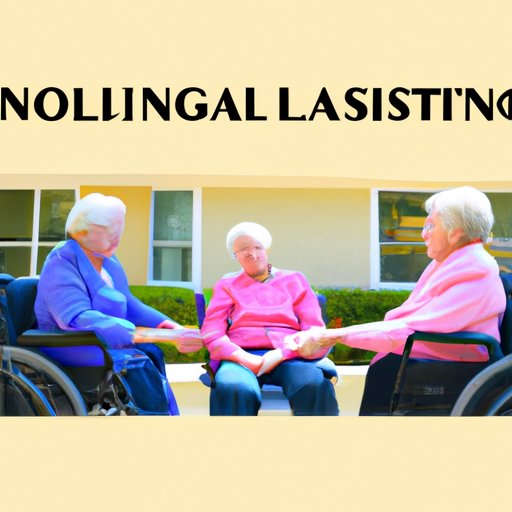An Overview of Assisted Living vs. Nursing Home Care
As we age, some of us may need extra support with everyday tasks. We may require assistance with activities of daily living (ADLs) such as dressing, bathing, and managing medications. For many seniors, these needs can be met through in-home care or assisted living facilities. But for those who need more intensive care, a nursing home may be the best option.
Assisted living and nursing home care are two different types of senior living options. It’s important to understand the differences between them so that you can make an informed decision about which type of care is right for you or your loved one.
Definition of Assisted Living
Assisted living is a type of senior living facility designed to provide supportive services for older adults who need help with ADLs. These facilities typically offer meals, transportation, housekeeping, laundry services, and 24-hour supervision. They also provide access to social activities, fitness programs, and other recreational opportunities.
Residents of assisted living facilities typically live in their own private apartments or rooms. They are able to come and go as they please and maintain a degree of independence. Assisted living facilities are not medical facilities, however, and they do not provide medical care.
Definition of Nursing Home Care
Nursing home care is a type of long-term care facility designed to provide comprehensive medical care and assistance with ADLs for people who cannot take care of themselves. Nursing homes are staffed by nurses, doctors, and other healthcare professionals who provide round-the-clock care and monitoring.
Residents of nursing homes typically live in shared rooms and receive assistance with all aspects of daily life. Nursing homes are equipped to handle complex medical conditions and provide rehabilitation and other specialized services.
General Differences Between Assisted Living and Nursing Home Care
The primary difference between assisted living and nursing home care is the level of care provided. Assisted living facilities provide supportive services for seniors who need help with ADLs but do not need full-time medical care. Nursing homes provide comprehensive medical care and assistance with ADLs for seniors who cannot take care of themselves.
Another key difference is the cost. Assisted living is generally less expensive than nursing home care. Additionally, assisted living facilities typically provide more amenities and offer a greater sense of autonomy and independence compared to nursing homes.

Comparing the Benefits of Assisted Living and Nursing Home Care
Both assisted living and nursing home care have their own unique benefits. Let’s explore the benefits of each type of care in more detail.
Assisted Living Benefits
Assisted living facilities provide seniors with the opportunity to remain independent while receiving the assistance they need. Residents enjoy the freedom to come and go as they please, while having access to on-site staff and support. Assisted living facilities also provide access to social activities, meals, and housekeeping services.
Nursing Home Benefits
Nursing homes provide comprehensive medical care and assistance with ADLs for seniors who cannot take care of themselves. In addition to providing round-the-clock care and monitoring, nursing homes also offer rehabilitation services, specialized treatments, and other therapeutic programs. Nursing homes also provide social activities and recreational opportunities for residents.

Exploring the Pros and Cons of Assisted Living vs. Nursing Home Care
When considering assisted living or nursing home care, it’s important to weigh the pros and cons of each option. Here are some of the key advantages and disadvantages of both types of care.
Pros of Assisted Living
- Greater sense of independence and autonomy
- Access to supportive services and social activities
- Less expensive than nursing home care
- More amenities and recreational opportunities
Cons of Assisted Living
- Limited medical care
- May not be suitable for those with complex medical needs
- May require additional outside care
Pros of Nursing Home Care
- Comprehensive medical care and monitoring
- Rehabilitation and specialized treatments available
- Social activities and recreational opportunities
Cons of Nursing Home Care
- Higher cost than assisted living
- Less autonomy and independence
- May require additional outside care
How to Choose Between Assisted Living and Nursing Home Care
Choosing between assisted living and nursing home care can be a difficult decision. There are several factors to consider when making this decision, including the level of care needed, the cost, the location, and the amenities.
Consider the Level of Care Needed
The first step in deciding between assisted living and nursing home care is to determine the level of care that is needed. If the person requires only minimal assistance with ADLs, then assisted living may be the better option. On the other hand, if the person needs more intensive medical care and assistance with ADLs, then nursing home care may be the better choice.
Consider the Cost
It’s also important to consider the cost of both types of care. Assisted living is generally less expensive than nursing home care, but there can be a wide range of prices depending on the facility and the level of care needed. It’s important to carefully research the cost of both types of care before making a decision.
Consider the Location
Location is another important factor to consider when choosing between assisted living and nursing home care. Assisted living facilities are typically located in residential areas, while nursing homes may be located in more rural or remote areas. It’s important to consider the proximity of family and friends when making this decision.
Consider the Amenities
Finally, it’s important to consider the amenities offered at each type of facility. Assisted living facilities typically offer more amenities than nursing homes, such as access to social activities, fitness programs, housekeeping services, and more. It’s important to consider these amenities when making your decision.

The Cost Difference Between Assisted Living and Nursing Home Care
The cost of assisted living and nursing home care varies widely depending on the facility, the level of care needed, the location, and other factors. Here are some average costs for both types of care.
Average Cost of Assisted Living
The average monthly cost of assisted living ranges from $2,500 to $4,000 per month. The cost can vary significantly depending on the type of facility, the level of care needed, and other factors.
Average Cost of Nursing Home Care
The average monthly cost of nursing home care ranges from $7,000 to $11,000 per month. Again, the cost can vary significantly depending on the type of facility, the level of care needed, and other factors.
Factors That Affect the Cost of Assisted Living and Nursing Home Care
There are several factors that can affect the cost of both assisted living and nursing home care. These include the type of facility, the level of care needed, the location, the amenities offered, and other factors. It’s important to research the cost of each type of care before making a decision.
Understanding the Different Levels of Care Provided in Assisted Living and Nursing Home Care
Assisted living and nursing home care provide different levels of care. Here is a brief overview of the types of care offered in each type of facility.
Types of Care Offered in Assisted Living
- Assistance with ADLs such as dressing, bathing, and managing medications
- 24-hour supervision and monitoring
- Meals, transportation, housekeeping, and laundry services
- Access to social activities, fitness programs, and other recreational opportunities
Types of Care Offered in Nursing Home Care
- Comprehensive medical care and assistance with ADLs
- Round-the-clock care and monitoring
- Rehabilitation services, specialized treatments, and other therapeutic programs
- Social activities and recreational opportunities

A Guide to Deciding Between Assisted Living and Nursing Home Care
Deciding between assisted living and nursing home care can be a difficult decision. Here are some tips to help you make the best choice for you or your loved one.
Determine the Level of Care Needed
The first step is to determine the level of care that is needed. If the person requires only minimal assistance with ADLs, then assisted living may be the better option. On the other hand, if the person needs more intensive medical care and assistance with ADLs, then nursing home care may be the better choice.
Consider the Cost
It’s also important to consider the cost of both types of care. Assisted living is generally less expensive than nursing home care, but there can be a wide range of prices depending on the facility and the level of care needed. It’s important to carefully research the cost of both types of care before making a decision.
Consider the Amenities
When choosing between assisted living and nursing home care, it’s important to consider the amenities offered at each type of facility. Assisted living facilities typically offer more amenities than nursing homes, such as access to social activities, fitness programs, housekeeping services, and more.
Consider the Location
Location is another important factor to consider when choosing between assisted living and nursing home care. Assisted living facilities are typically located in residential areas, while nursing homes may be located in more rural or remote areas. It’s important to consider the proximity of family and friends when making this decision.
Speak with a Professional for Advice
Finally, it’s important to speak with a professional for advice. A doctor, geriatric care manager, or other healthcare professional can provide valuable insight into the best type of care for you or your loved one. They can also provide resources and referrals to nearby facilities.
(Note: Is this article not meeting your expectations? Do you have knowledge or insights to share? Unlock new opportunities and expand your reach by joining our authors team. Click Registration to join us and share your expertise with our readers.)
